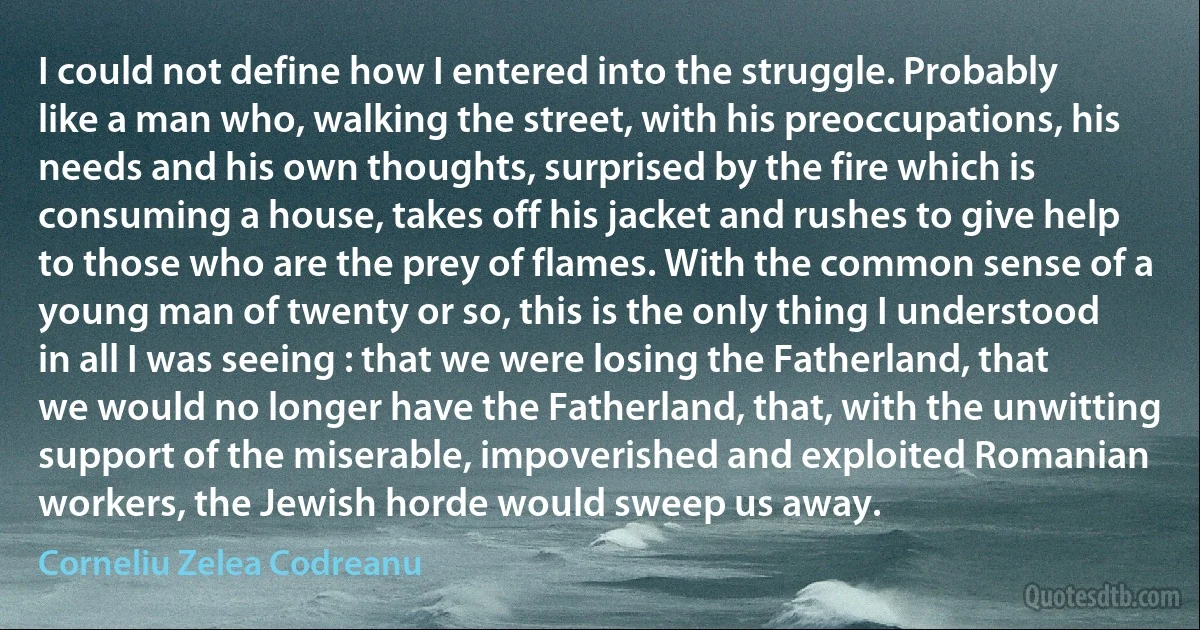Fatherland Quotes - page 2
Arise, children of the Fatherland,
The day of glory has arrived!
Against us tyranny's
Bloody banner is raised ...
Do you hear, in the countryside,
The roar of those ferocious soldiers?
They're coming right into your arms
To slaughter your sons, your companions!! To arms, citizens,
Form your battalions,
Let's march, let's march!
Let an impure blood
Soak our fields!

Claude Joseph Rouget de Lisle
Therefore, since the others are so lacking in spirit, I think it is opportune for you to head the war against the King; and, while it is only natural for the other descendants of Heracles, and for men who are under the bonds of their polities and laws, to cleave fondly to that state in which they happen to dwell, it is your privilege, as one who has been blessed with untrammeled freedom, to consider all Hellas (Greece) your fatherland, as did the founder of your race, and to be as ready to brave perils for her sake as for the things about which you are personally most concerned.

Isocrates
I started with an impulse of my heart, with that instinct of defense which even the least of the worms has, not with the instinct of personal self-preservation, but of defense of the race to which I belong. This is why I have always had the feeling that the whole race rests on our shoulders, the living, and those who died for the Fatherland, and our entire future, and that the race struggles and speaks through us, that the hostile flock, however huge, in relation to this historical entity, is only a handful of human detritus which we will disperse and defeat... The individual in the framework and in the service of his race, the race in the framework and in the service of God and of the laws of the divinity: those who will understand these things will win even though they are alone. Those who will not understand will be defeated.

Corneliu Zelea Codreanu
However, mass expulsion and even genocide began to make their appearance on the southern margins of Europe during and after World War I, as the Turks set about the mass extirpation of the Armenians in 1915 and, after the Greco Turkish war of 1911, expelled between 1.3 and 1.5 millions of Greeks from Asia Minor, where they had lived since the days of Homer.1 Subsequently Adolph Hitler, who was in this respect a logical Wilsonian nationalist, arranged to transfer Germans not living on the territory of the fatherland, such as those of Italian South Tyrol, to Germany itself, as he also arranged for the permanent elimination of the Jews.

Eric Hobsbawm
However, his contemporary, Leibnitz, the father of the German enlightenment, who created an optimistic world-picture, always remained only a philosopher for philosophers. Even Immanuel Kant, although always famous, was never popular. In his own fatherland he was all but forgotten for most of the nineteenth century until revived by Hermann Cohen and his school. Spinoza, however, was never exhumed because he was never buried. Kant, because of his exclusive intellectuality, has influenced only his students, while Spinoza, because of his emotional appeal, has ruled even those who have never heard his name.

Baruch Spinoza
The hour has struck! Raise aloft the banner of insurrection and lead the people throughout the country to overthow the Japanese and the French! The sacred call of the fatherland is resounding in our ears; the ardent blood of our heroic predecessors is seething in our hearts! The fighting spirit of the people is mounting before our eyes! Let us unite and unify our action to overthrow the Japanese and the French.

Ho Chí Minh
Maintaining a rotten economic system has nothing to do with nationalism, which is an affirmation of the Fatherland. I can love Germany and hate capitalism. Not only can I, I must. Only the annihilation of a system of exploitation carries with it the core of the rebirth of our people.

Joseph Goebbels
Socialism is the doctrine of liberation for the working class. It promotes the rise of the fourth class and its incorporation in the political organism of our Fatherland, and is inextricably bound to breaking the present slavery and regaining German freedom. Socialism, therefore, is not merely a matter of the oppressed class, but a matter for everyone.

Joseph Goebbels
If a Communist shouts "Down with nationalism!”, he means the hypocritical bourgeois patriotism that sees the economy only as a system of slavery. If we make clear to the man of the left that nationalism and capitalism, that is the affirmation of the Fatherland and the misuse of its resources, have nothing to do with each other, indeed that they go together like fire and water, then even as a socialist he will come to affirm the nation, which he will want to conquer.

Joseph Goebbels
The faith in the nation is a matter for everyone, never a group, a class or an economic clique. The eternal must be distinguished from the temporal. Maintaining a rotten economic system has nothing to do with nationalism, which is an affirmation of the Fatherland. I can love Germany and hate capitalism. Not only can I, I must. Only the annihilation of a system of exploitation carries with it the core of the rebirth of our people.

Joseph Goebbels



